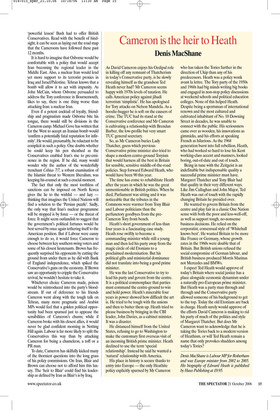Cameron is the heir to Heath
Denis MacShane
As David Cameron enjoys his Oedipal role in killing off any remnant of Thatcherism in today’s Conservative party, is he slowly revealing himself as the grandson Ted Heath never had? Mr Cameron seems happy with 1970s levels of taxation. He calls American policy against jihadi terrorism ‘simplistic’. He has apologised for Tory attacks on Nelson Mandela. As a hoodie-hugger he is soft on the causers of crime. The TUC had its stand at the Conservative conference and Mr Cameron is cultivating a relationship with Brendan Barber, the low-profile but very smart TUC general secretary.
So, as Mr Cameron buries Lady Thatcher, guess which previous Conservative prime minister also tried to shape a modern centre-ground Toryism that would harness all the best in Britain for sensible, sensitive middle-of-the-road policies. Step forward Edward Heath, who would have been 90 this year.
The time has come to rehabilitate Heath after the years in which he was the great unmentionable in British politics. When he died, Parliament was sitting and it was noticeable that the tributes in the Commons were warmer from Tony Blair and Labour politicians than the perfunctory goodbyes from the preCameron Tory front bench.
Heath’s short government of less than four years is a fascinating case study. Heath rose swiftly to become a commanding minister while still a young man and then led his party away from the magic circle of old Etonians to a proclaimed modernisation. But his political gifts and ministerial dominance did not translate into being a good prime minister.
He was the last Conservative to try to lead his party and govern from the centre. It is a political commonplace that parties must command the centre-ground to win and hold power. Heath’s miserable four years in power showed how difficult the art is. He tried to be tough with the unions and then to butter them up. Heath tried to please business by bringing in the CBI leader, John Davies, as a cabinet minister. It was a disaster.
He distanced himself from the United States, refusing to go to Washington to make the customary first overseas visit of an incoming British prime minister. Heath declined to use the term ‘special relationship’. Instead he said he wanted a ‘natural’ relationship with America.
His place in history is secure thanks to entry into Europe — the only Heathite policy explicitly spurned by Mr Cameron who has taken the Tories further in the direction of Ukip than any of his predecessors. Heath was a policy wonk avant la lettre. The Tory party of the 1950s and 1960s had big minds writing big books and engaged in non-stop policy discussions at weekend schools and political education colleges. None of this helped Heath. Despite being a sportsman of international renown and the most cultured and cultivated inhabitant of No. 10 Downing Street in decades, he was unable to connect with the public. His seriousness came over as wooden, his innovations as gimmicks, and his efforts at speaking French as hilarious. As the 1968 generation burst into full rebellion, Heath, who had worked so hard to lose his Kent working-class accent and manners, looked boring, out-of-date and out of touch.
Being in tune with the Zeitgeist is an indefinable but indispensable quality a successful prime minister must have. Margaret Thatcher and Tony Blair had that quality in their very different ways. Like Jim Callaghan and John Major, Ted Heath was out of touch with the rapidly changing Britain he presided over.
He wanted to govern Britain from the centre and play fair in a classic One Nation sense with both the poor and less-well-off, as well as support tough, no-nonsense business decisions. He relied on the corporatist, consensual style of ‘Whitehall knows best’. He wanted Britain to be more like France or Germany, whose growth rates in the 1960s were double that of Britain. But British unions refused the social compromise of German labour, and British business produced Morris Marinas not Mercedes and BMWs.
I expect Ted Heath would approve of today’s Britain where social justice has a place alongside economic dynamism under a naturally pro-European prime minister. But Heath was a party man through and through and the Conservative party allowed someone of his background to get to the top. Today the old Etonians are back in charge. Heath surely would approve of the efforts David Cameron is making to rid his party of much of the politics and style of Margaret Thatcher. But does Mr Cameron want to acknowledge that he is taking the Tories back to a modern version of Heathism, or will Ted Heath remain a name that only provokes shudders among today’s Tories?


































































































 Previous page
Previous page